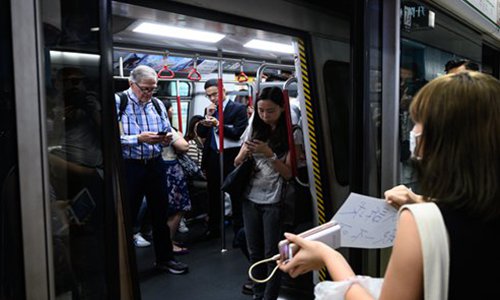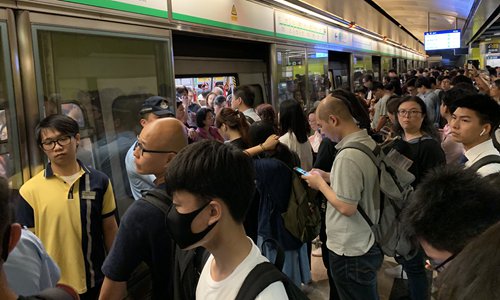During weeks of anti-government protests in Hong Kong, protesters have waved the American flag, British colonial flag and even flags of the island of Taiwan.

Passengers look at their mobile phones inside a train as a protester (right) chants slogans from the platform of Kowloon Tong MTR station during a non-cooperation movement in Hong Kong on Wednesday. (Photo: AFP)
Chinese experts see "black hands" from Taiwan behind the scenes, which have helped exacerbate the public outcry and lead the city into chaos, violence and recession.
The Taiwan Affairs Office of the State Council in Beijing singled out the island's pro-independence Democratic Progressive Party (DPP) twice in a week and has warned it to stop meddling in Hong Kong affairs.
On August 19, office spokesperson Ma Xiaoguang warned the party not to indulge criminals in any form following its announcement of "humanitarian support" for Hong Kong.
Earlier, the DPP took to Facebook saying through its leader Tsai Ing-wen and relevant government agencies that they will provide humanitarian assistance to Hong Kong.
On August 13, Ma criticized the DPP's "disgraceful role in the recent chaos in Hong Kong" and urged the party and its authorities to "stop interfering in Hong Kong affairs."
Tung Chee-hwa, former chief executive of the Hong Kong Special Administration Region, said there was reason to believe that Taiwan and the US were the "masterminds behind the current Hong Kong disturbance," which was well organized and escalated quickly.
Foreign politicians and anti-China forces have been seeking to destroy the relationship between Hong Kong and the mainland, with the ultimate purpose of making Hong Kong a battleground for international games, a base against the Chinese central government and a pawn to contain China, Tung said.

Passenges wait for a subway train at Tiu Keng Leng station in Hong Kong Tuesday morning, when protesters disrupted metro service. (Photo: GT)
Taiwan factor
The murder last year of a Hong Kong woman vacationing in Taiwan was the reason Hong Kong officials offered for introducing the extradition bill. The bill was intended to enable Hong Kong to transfer fugitives to Taiwan and to the Chinese mainland, plugging a loophole in the city's legal system.
Hong Kong police said the woman's Hong Kong boyfriend confessed his crime on his return to the city but they could not file murder charges against the suspect. He is now in jail on minor money-laundering charges.
Taiwan interfered in the case, former Hong Kong secretary of security Regina Ip Lau Suk-yee told the Global Times. Hong Kong and Taiwan have no official contact, but they cooperate on law enforcement, she explained.
"Taiwan police told me at the beginning that Taiwan was willing to extradite the suspect, but as the situation turned political, Taiwan's 'Mainland Affairs Council' got involved and division emerged among the Taiwan police," Ip said.
"Apparently, they bore pressure from Taiwan authorities."
It was not surprising to find the island of Taiwan intervened in the ongoing unrest in Hong Kong and how anti-government and anti-China forces coordinated with each other, Chinese experts noted.
On August 13, when black-clad protesters illegally occupied the Hong Kong airport and seriously disrupted normal operations, some blocked security checkpoints to prevent passengers from passing through.
However, when passengers from Taiwan tried to get through, protesters began to disperse to let them pass and some even shouted slogans in support of Tsai.
The Global Times reporters saw some passengers from Taiwan interacting with protesters, shouting "Hong Kong, Add oil! [fighting]"
On social network platforms like LIHKG and Telegram which are often used by anti-government groups, internet users in Taiwan take photos of their identity cards and send cheerful notes to encourage young Hongkongers to continue taking to the streets.
On social network platforms like LIHKG and Telegram which are often used by anti-government groups, internet users in Taiwan take photos of their identity cards and send cheerful notes to encourage young Hongkongers to continue taking to the streets.
Anti-government forces and secessionists from the island of Taiwan are coordinating with each other to challenge the central government in Beijing and the "one China, two systems" policy, the Chinese experts warn.
Hong Kong protesters broke into the Legislative Council Complex on July 1, spray-painting slogans such as "Sunflower HK," referring to the 2014 "Sunflower Movement" against the Cross-Strait Service Trade Agreement signed between the mainland and Taiwan.
Lin Fei-fan, a Taiwan activist who led the Sunflower Movement, right away defended rioters on social media.
Some media on the island of Taiwan and in Hong Kong also called it "Taiwan Sunflower Movement in HK" as it recreated a scene reminiscent of the takeover of the "Legislative Yuan" in Taipei in 2014.
Taiwan authorities
Taiwan has now become a haven for rioters who fled Hong Kong to seek asylum on the island after breaking the law by storming LegCo on July 1, according to media reports.
Taiwan leader Tsai Ing-wen has tweeted frequently on Hong Kong, saying "the international community is seriously concerned about the clashes between police and protesters in Hong Kong."
Some Taiwan people have been channeling funds and supplies to Hong Kong anti-government protesters.
On social media, pictures have suggested that some people on the island are holding fundraising activities for Hong Kong protesters: Sales of hard hats and gas masks are reportedly rising rapidly.
Protesters from Hong Kong also buy their supplies from stores in Taipei and ship them to the city.
Taiwan companies like ForFun Creative authorized some souvenir pin products as a way of supporting the protesters and part of the revenue is said to be channeled to the movement.
Chiu Yi, a former Kuomintang legislator, said Tsai "behind the scenes" has been providing financial support and training for guerilla-style street fights and violent attacks, helping agitate and mislead the public while backing asylum for Hong Kong secessionists.
Tsai has four purposes for her behavior, Chiu explained.
"First, she coordinates with the US to play the Hong Kong card to show to the US that she is an obedient and useful pawn," Chiu said.
"Second, she aims to destroy 'one country, two systems' and jeopardize cross-Straits expectations of reunification. Third, she wants to stoke anti-mainland sentiment in Taiwan so as to win support for next year's election. Fourth, by collaborating with Hong Kong secessionist forces, she can easily get down to her 'two countries' path," Chiu said.
Chan King, vice president of the Hong Kong Chinese Importers' & Exporters' Association, told the Global Times that the Hong Kong unrest resulted from "collusion between pro-secession activists in the two regions."
Meddling in Hong Kong affairs and leading the city into chaos meant "Tsai was trying to prove that 'one country, two systems' is a failure and hinders the peaceful reunification of the island of Taiwan with the Chinese mainland," Chan said.
He urged the public to have a clearer view of such motives behind the anti-government movement in Hong Kong.
Wang Jiang, an associate research fellow at the institute of law, Chinese Academy of Social Sciences in Beijing, said he believes that Taiwan authorities played the card of freedom and democracy to attract the eyeballs of some Western countries.
"The mainland's suspension of individual trips to the island of Taiwan has already been a countermeasure," Wang said.


